English
English词组
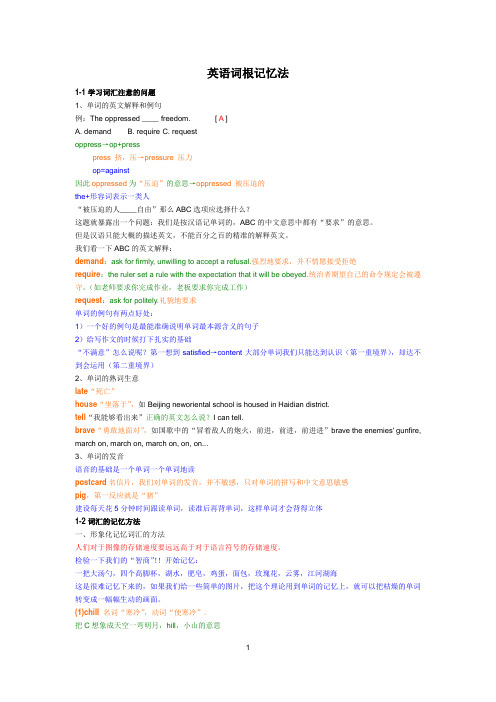
英语词根记忆法1-1学习词汇注意的问题1、单词的英文解释和例句例:The oppressed ____ freedom. [ A ]A. demandB. requireC. requestoppress→op+presspress 挤,压→pressure 压力op=against因此oppressed为“压迫”的意思→oppressed 被压迫的the+形容词表示一类人“被压迫的人____自由”那么ABC选项应选择什么?这题就暴露出一个问题:我们是按汉语记单词的,ABC的中文意思中都有“要求”的意思。
但是汉语只能大概的描述英文,不能百分之百的精准的解释英文。
我们看一下ABC的英文解释:demand:ask for firmly, unwilling to accept a refusal.强烈地要求,并不情愿接受拒绝require:the ruler set a rule with the expectation that it will be obeyed.统治者期望自己的命令规定会被遵守。
(如老师要求你完成作业,老板要求你完成工作)request:ask for politely.礼貌地要求单词的例句有两点好处:1)一个好的例句是最能准确说明单词最本源含义的句子2)给写作文的时候打下扎实的基础“不满意”怎么说呢?第一想到satisfied→content大部分单词我们只能达到认识(第一重境界),却达不到会运用(第二重境界)2、单词的熟词生意late“死亡”house“坐落于”,如Beijing neworiental school is housed in Haidian district.tell“我能够看出来”正确的英文怎么说?I can tell.brave“勇敢地面对”,如国歌中的“冒着敌人的炮火,前进,前进,前进进”brave the enemies' gunfire, march on, march on, march on, on, on...3、单词的发音语音的基础是一个单词一个单词地读postcard名信片,我们对单词的发音,并不敏感,只对单词的拼写和中文意思敏感pig,第一反应就是“猪”建设每天花5分钟时间跟读单词,读准后再背单词,这样单词才会背得立体1-2词汇的记忆方法一、形象化记忆词汇的方法人们对于图像的存储速度要远远高于对于语言符号的存储速度。
English 国家名,国家人,语言,首都
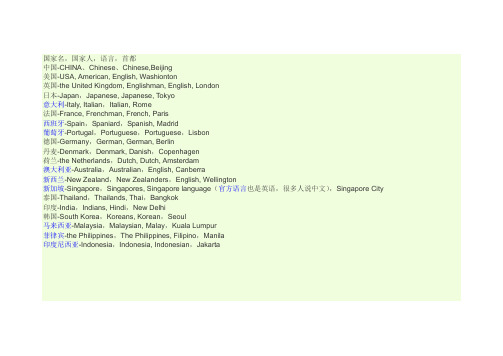
国家名,国家人,语言,首都中国-CHINA、Chinese、Chinese,Beijing美国-USA, American, English, Washionton英国-the United Kingdom, Englishman, English, London日本-Japan,Japanese, Japanese, Tokyo意大利-Italy, Italian,Italian, Rome法国-France, Frenchman, French, Paris西班牙-Spain,Spaniard,Spanish, Madrid葡萄牙-Portugal,Portuguese,Portuguese,Lisbon德国-Germany,German, German, Berlin丹麦-Denmark,Denmark, Danish,Copenhagen荷兰-the Netherlands,Dutch, Dutch, Amsterdam澳大利亚-Australia,Australian,English, Canberra新西兰-New Zealand,New Zealanders,English, Wellington新加坡-Singapore,Singapores, Singapore language(官方语言也是英语,很多人说中文),Singapore City 泰国-Thailand,Thailands, Thai,Bangkok印度-India,Indians, Hindi,New Delhi韩国-South Korea,Koreans, Korean,Seoul马来西亚-Malaysia,Malaysian, Malay,Kuala Lumpur菲律宾-the Philippines,The Philippines, Filipino,Manila印度尼西亚-Indonesia,Indonesia, Indonesian,Jakarta世界主要国家NO. Country Full Name Abbreviation Capital People Official Language National Flag 1 China People’s Republic of China PRC/CHN Beijing Chinese Chinese2 America United States of America USA Washington D.C. American English3 Canada The Dominion of Kanada (初期使用) Canada Ottawa渥太华['ɔtəwə]Canadian English & French4 Britain/UnitedKingdom The United Kingdom of GreatBritain and Northern IrelandUK London BritishEnglishmanEnglishwomanEnglish5 Spain Reino de España ES/Spain Madrid马德里[mə'drid]Spanish Spanish 6 Italy The Republic of Italy Italy Rome Italian Italian7 Switzerland瑞士['switsələnd] Swiss Confederation SUI Berne/Bern伯尔尼[bə:n]German, French,Italian8 France The Republic of France FRA Paris FrenchmanFrenchFrench9 NetherlandHolland荷兰The Kingdom of theNetherlandsNLD Amsterdam阿姆斯特丹[’æmstə’dæm]Dutchman Dutch10 Belgium比利时['beldʒəm] The Kingdom of Belgium BEL Brussels布鲁塞尔['brʌslz]Belgian['beldʒən]Dutch, English,French11 Germany Berlin[bə:'lin]German German12 Portugal葡萄牙['pɔ:tjuɡəl] The Portuguese Republic TPR Lisbon里斯本['lizbən]Portuguese[,pɔːtjʊ'giːz]French13 Denmark['denma:k] The Kingdom of Denmark DNK Copenhagen哥本哈根[,kəupən'heiɡən]Dane[dein]English, Danish14 Finland The Republic of Finland FIN Helsinki赫尔辛基['helsiŋki] Finlander['finləndə]/FinnishFinnish, Swedish15 Sweden瑞典['swi:dən] The Kingdom of Sweden SWE Stockholm斯德哥尔摩['stɔkhəum]Swede[swiːd]English16 Ireland The Republic of Ireland Dublin都柏林['dʌblin] Irish['aiəriʃ]English17 Thailand Kingdom of Thailand Bangkok曼谷[bæŋˈkɔk]Thai Thai18 Korea Republic of Korea KOR Seoul汉城,首尔Korean Korean19 Japan Japan JPN Tokyo Japanese Japanese20 India Republic of India India New Delhi新德里Indian English & Hindi。
english 词语表(1)(1)
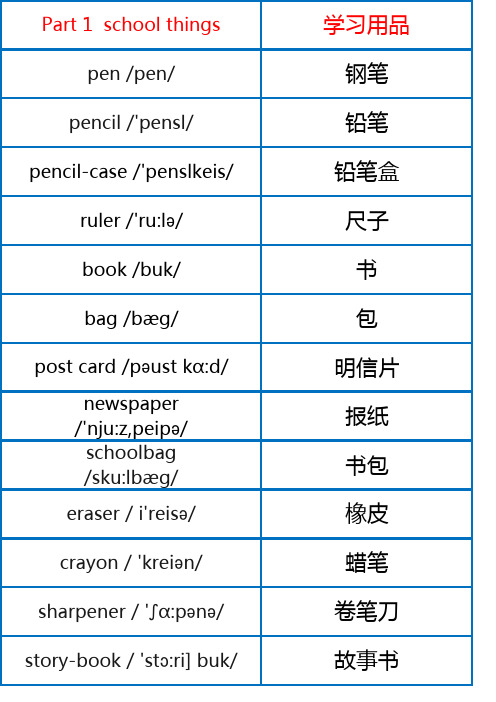
Part 1 school things学习用品pen /pen/钢笔pencil /'pensl/铅笔pencil-case /'penslkeis/铅笔盒ruler /'ru:lə/尺子book /buk/书bag /bæg/包post card /pəust kɑ:d/明信片newspaper /'nju:z,peipə/报纸schoolbag/sku:lbæg/书包eraser / i'reisə/橡皮crayon / 'kreiən/蜡笔sharpener / 'ʃɑ:pənə/卷笔刀story-book / 'stɔ:ri] buk/故事书notebook / 'nəutbuk/笔记本Chinese book / 'tʃai'ni:z/语文书English book / 'iŋgliʃ/英语书maths book / mæθs/数学书magazine / mægə'zi:n/杂志newspaper / 'nju:z,peipə /报纸 dictionary / 'dikʃəneri/词典Part 2 body身体部位foot / fut/脚head / hed/头face / feis/脸nose / nəuz/鼻子eye / ai/眼睛arm / ɑ:m/手臂finger / 'fiŋgə/手指leg / leg/腿Part 3 colours颜色blue /blu/蓝green /gri:n/绿white /wait/白black /blæk/黑purple /'pə:pl/紫brown /braun/棕cat /kæt/猫dog /dɔg/狗pig /pig/猪duck /dʌk/鸭rabbit /'ræbit/兔子horse /hɔ:s/马elephant /'elifənt/大象ant /ænt/蚂蚁fish /fiʃ/鱼bird /bə:d/鸟snake /sneik/蛇mouse /maus/鼠kangaroo /,kæŋgə'ru/袋鼠monkey /'mʌŋki/猴子panda /'pændə/熊猫bear /bɛə/熊lion /'laiən/狮tiger /'taigə/老虎fox /fɔks/狐狸zebra /'zi:brə/斑马deer /diə/鹿giraffe /dʒi'rɑ:f/长颈鹿goose /gu:s/鹅hen /hen/母鸡turkey /'tə:ki/火鸡lamb /læm/小羊sheep /ʃi:p/绵羊goat /gəut/山羊cow /kau/奶牛shark /'ʃɑ:k/鲨鱼seal / si:l/海豹butterfly蝴蝶Part 5 people人物friend /frend/朋友boy / bɔi/男孩girl /gə:l/女孩mother /'mʌðə/母亲father /'fɑ:ðə/父亲sister /'sistə/姐妹brother /'brʌðə/兄弟uncle /'ʌŋkl/叔叔man /mæn/男人woman/ 'wumən/女人lady /'leidi/女士dad /dæd/爸爸grandma /'grændmɑ:/外/祖母grandmother /'grænd,mʌðə/aunt /ɑ:nt/阿姨cousin /'kʌzn/堂兄妹son /sʌn/儿子baby /'beibi/婴儿kid /kid/小孩classmate/'klɑ:smeit/同学queen /'kwi:n/女visitor /'vizitə/参观者neighbour /'neibə/邻居principal /'prinsəpəl/校长pen pal / pen pæl/笔友tourist /'tu:rist/旅行者people /'pi:pl/人物robot /'rəubɔt /机器人friends朋友Part 6 job职业teacher /'ti:tʃə/教师student /'stju:dənt/学生doctor /'dɔktə/医生nurse /nə:s/护士driver /'draivə/司机farmer /'fɑ:mə/农民singer /'siŋə/歌唱家writer /'raitə/作家artist /'ɑ:tist/画家actor /'æktə/男演员actress/'æktris/女演员/TV reporter /ri'pɔ:tə/电视台记者engineer /'endʒi'niə/工程师policeman / pə'li:smən /(男)警察salesperson /'seilz,pə:sn/销售员cleaner /'kli:nə/清洁工baseball player/'beis,bɔ:l棒球运动员'pleiə/assistant / ə'sistənt/售货员Part 7 food and drink食品breakfast /'brekfəst/早餐lunch /lʌntʃ/中餐dinner /'dinə/晚餐egg /eg/鸡蛋rice /rais/米饭cake /keik/蛋糕bread /bred/面包jam /dʒæm/果酱biscuit /'biskit/饼干sausage /'sɔ:sidʒ/香肠sandwich /'sændwitʃ/三明治dumplings /'dʌmpliŋ/饺子French fries /frentʃ fraiz/薯条meat /mi:t/肉chicken /'tʃikin/鸡肉mutton /'mʌtn/羊肉beef /bi:f/牛肉pork /pɔ:k/猪肉fish /fiʃ/鱼hamburger /'hæmbə:gə/汉堡hot dog /hɔt dɔg/热狗noodles /'nu:dl/面条soup /su:p/汤salad /'sæləd/沙拉milk /milk/牛奶water /'wɔ:tə/水ice-cream /ais kri:m/冰淇淋cola /'kəulə/可乐juice /dʒu:s/果汁tea /ti/茶coffee /'kɔfi/咖啡fruit/fru:t/水果apple /'æpl/苹果banana / bə'nɑ:nə/香蕉pear /pɛə/梨orange /'ɔ:rindʒ/橙watermelon /'wɔ:tə,melən/西瓜grape / greip/葡萄cherry/'tʃeri/樱桃lemon/ 'lemən/柠檬mango/ 'mæŋgəu/芒果coconut/'kəukənʌt/椰子peach /pi:tʃ/桃strawberry / 'strɔ:bəri/草莓vegetable / 'vedʒitəbl/蔬菜eggplant / 'egplɑ:nt/茄子mushroom /'mʌʃruːm; -rʊm/香菇cucumber/'kjuːkʌmbə/黄瓜house /rəud/房子bridge / bridʒ/桥building /'bildiŋ/建筑物rain /rein/雨cloud /klaud/云sun /sʌn/太阳mountain /'mauntin/大山sky /skai/天空rainbow /'reinbəu/彩虹wind /waind/风air /ɛə/空气Part 14 plants植物flower /'flauə/花grass /grɑ:s/草tree /tri/树seed /si:d/种子leaf /li:f/树叶plant /plɑ:nt/植物rose /rəuz/玫瑰Part 15 week星期Monday/'mʌndei/星期一Tuesday/'tju:zdi/星期二Wednesday/wenzdi/星期三Thursday/'θə:zdi/星期四Friday /'fraidi/星期五Saturday/'sætədi/星期六Sunday /'sʌndi/星期天weekend/'wi:k'end/周末Part 16 months月份January/'dʒænjueri/一月February/'februəri/二月March /mɑ:tʃ/三月April /'eiprəl/四月May /mei/五月June /dʒu:n/六月July /dʒu:'lai/七月August /ɔ:'gʌst/八月September /sep'tembə/九月October /ɔk'təubə/十月November /nəu'vembə/十一月December /di'sembə/十二月Part17 seasons季节spring /spriŋ/春天summer /'sʌmə/夏天fall/autumn/fɔ:l 'ɔ:təm/秋天winter/'wintə/冬天Part 18 directions方位south/sauθ/南north/nɔ:θ/北east/i:st/东west/west/西left/left/左right/rait/右Part19 illness患病have a fever /'fi:və/发高烧hurt /hə:t/疼痛have a cold /kəuld/伤风have a toothache /'tu:θei/牙疼have a headache /'hedeik/头疼have a sore throat /sɔ: θrəut/喉咙疼have a stomachache/'stʌməkeik/胃痛Part20 number数词one、two、three一、二、三four、five、six四、五、六seven、eight、nine七、八、九ten十eleven十一twelve十二thirteen十三fourteen/十四fifteen十五sixteen十六seventeen十七eighteen十八nineteen十九twenty二十thirty三十forty四十fifty五十seventy七十eighty八十ninety九十hundred /'hʌndrəd/一百first第一second第二third第三fourth第四fifth第五sixth第六seventh第七eighth第八ninth第九tenth第十eleventh第十一twelfth第十二Part 21 adj形容词big /big/大的small/smɔ/小的long/ lɔŋ/长的tall/tɔ:l/高的short/ʃɔ:t/短的young/jʌŋ/年轻的old/əuld/老的strong/strɔŋ/强壮的thin/θin/瘦的active/'æktiv/积极的quiet/'kwaiət/安静的nice/nais/好的kind/kaind/善良的strict/strikt/严格的smart/smɑ:t/聪明的funny/'fʌni/滑稽的sweet/swi:t/甜的salty/'sɔ:lti/咸的sour/'sauə/酸的fresh/freʃ/新鲜favourite/'feivəri t/最喜欢的clean/kli:n/干净的tired/'taiəd/累的excited/ik'saitid/兴奋的angry/'æŋgri/生气的happy/'hæpi/高兴的bored/bɔ:d/无聊的sad/sæd/难过的taller更高的shorter更短的stronger更强壮的older更老的younger更年轻的bigger更大的heavier更重的longer/更长的thinner更瘦的smaller更小的good好的better更好的higher更高的fine/fain/好的great/greit/棒的heavy/'hevi/重的new/nju/新的fat/fæt/胖的right /rait/对的hungry/'hʌŋgri/饿的cute/kju:t/可爱的little/'litl/小的lovely/'lʌvli/可爱的beautiful/'bju:təfəl/漂亮的colourful/'kʌləful/五颜六色的pretty/'priti/漂亮的cheap/tʃi:p/便宜的expensive/iks'pensiv/贵的juicy/'dʒu:si/有汁的healthy/'helθi/健康的helpful/'helpfəl/有帮助的high/hai/高的easy/'i:zi/简单的proud/praud/骄傲的Part22 prep介词in 在里面on 在上面under/'ʌndə/在下面near /niə/在附近behind/bi'haind/在后面next to 在旁边over/'əuvə/悬在...上面in front of/frʌnt/在前面Part23 pron代词I/ai/我we/wi/我们you/ju:/你/你们he/hi/他she/ʃi/她it/it/它they/ðei/他们my/mai/我的our/'auə/我们的your/juə/你的/你们的his/hiz/他的green beans青豆/ gri:n bi:ns/tomato / tə'meitəu/西红柿potato / pə'teitəu/土豆cucumber / 'kju:kəmbə/黄瓜onion / 'ʌnjən/洋葱pea / pi/豌豆cabbage /'kæbidʒ/卷心菜pumpkin / 'pʌmpkin/南瓜sweet potato红薯 /swi:t pə'teitəu/Part8 clothes衣服jacket /'dʒækit/夹克衫shirt /ʃə:t/衬衫T-shirt/恤衫skirt /skə:t/短裙子dress /dres/连衣裙jeans /dʒi:nz/牛仔裤pants /pænts/裤子trousers /'trauzəz/socks /sɔks/袜子shoes /ʃu:z/鞋子sweater /'swetə/毛衣coat /kəut/外套raincoat /'reinkəut/雨衣shorts /ʃɔ:ts/短裤sandals /'sændl/凉鞋boots /bu:ts/靴子cap /kæp/无边帽sunglasses /'sʌnglɑ:siz/太阳镜gloves /glʌvz/手套bike /baik/自行车bus /bʌs/公共汽车boat /bəut/小船yacht /jɔt/快艇taxi /'tæksi/出租车jeep /dʒi:p/吉普车van /væn/小货车subway /'sʌbwei/地铁Part10 other things杂物bottle瓶子brush刷子candle蜡烛clock闹钟cover盖子,罩drawer抽屉handbag手提包furniture家具iron熨斗rope粗绳;绳索rubbish垃圾;废物safe保险箱shelf架子(复shelves) shower淋浴soap肥皂stick木棍;手杖;枝条thing事;东西;局面; thread线toothpaste牙膏towel浴巾,毛巾umbrella /ʌm'brelə/雨伞watch手表window /'windəu/窗户door /dɔ/门desk /desk/课桌chair /tʃɛə/椅子bed /bed/床computer/kəm'pju:tə/计算机board /bɔ:d/写字板fan /fæn/风扇light /lait/灯mirror /'mirə/镜子teacher’s desk / 'ti:tʃə讲台desk/picture /'piktʃə/图画photo /'fəutəu/照片wall /wɔ:l/墙壁floor /flɔ/地板football /'futbɔ:l/足球present / 'preznt /礼物gift / gift/walkman / 'wɔ:kmən/随身听lamp /læmp/台灯phone /fəun/电话sofa /'səufə/沙发fridge /fridʒ/冰箱air-conditioner空调/ɛə kən'diʃənə/lock /lɔk/锁knife /naif/刀fork /fɔ:k/叉spoon /spu:n/勺子chopsticks /'tʃɔpstiks/筷子pot /pɔt/锅toy /tɔi/玩具doll /dɔl/洋娃娃ball /bɔ:l/球balloon /bə'lu:n/气球kite /kait/风筝jigsaw puzzle拼图游戏/'dʒigsɔ: 'pʌzl/box /bɔks/盒子umbrella /ʌm'brelə/伞zipper /'zipə/拉链violin /,vaiə'lin/小提琴nest /nest/鸟窝hole /həul/洞toothbrush /'tu:θbrʌʃ/牙刷menu /'menju/菜单e-card /kɑ:d/电子卡片e-mail /meil/电子邮件money /'mʌni/钱traffic light /'træfik lait/交通灯medicine /'medisin/药Part11 locations地点home /həum/家room /ru:m/房间bedroom /'bedrum/卧室bathroom /'bæθrum/卫生间living room / 'liviŋ ru:m /起居室/客厅kitchen /'kitʃin/厨房classroom /'klɑ:srum/教室school /sku:l/学校park /pɑ:k/公园library /'laibrəri/图书馆post office邮政局/pəust 'ɔ:fis/hospital /'hɔspitl/医院cinema /'sinimə/电影院bookstore /'bukstɔ/书店farm /fɑ:m/农场zoo /zu/动物园garden /'gɑ:dn/花园playground /'pleigraund/操场canteen /kæn'ti:n/餐厅teacher’s office /'ɔ:fis/教师办公室gym /dʒim/体育馆washroom /'wɔʃrum/盥洗室art room /ɑ:t ru:m/美术室computer room/kəm'pju:tə/电脑房music room /'mju:zik/音乐教室TV room电视房flat /flæt/公寓company /'kʌmpəni/公司factory /'fæktəri/工厂pet shop /pet ʃɔp/宠物店science museum /'saiəns mju:'ziəm/科学博物馆the Great Wall/greit wɔ:l/长城supermarket超市/'sju:pə,mɑ:kit/bank /bæŋk/银行country /'kʌntri/乡村village /'vilidʒ/村庄city /'siti/城市Part12 weather气象cold /kəuld/冷的hot /hɔt/热的warm /wɔ:m/温暖的cool /ku:l/凉爽的snowy /snəui/下雪的sunny /'sʌni/晴朗的rainy /'reini/下雨windy /'windi/刮风的cloudy /'klaudi/多云的weather report天气预报/'weðə ri'pɔ:t/sandstorm /'sæn(d)stɔːm/沙尘暴haze /heiz/薄雾、霾 雾Fog /fɒg/Part 13 nature/'neɪtʃə/自然river /'rivə/河流lake /leik/湖泊stream /stri:m/小溪forest /'fɔrist/森林path /pɑ:θ/小路road /rəud/马路her/hə/她的Part 24 verb动词play/plei/玩swim/swim/游泳skate/skeit/溜冰fly/flai/飞jump/dʒʌmp/跳walk/wɔ:k/走run/rʌn/跑climb/klaim/爬fight/fait/打架swing/swiŋ/荡秋千eat/i:t/吃sleep/sli:p/睡觉like/laik/喜欢have/hæv/有buy/bai/买take/teik /拍照/带live/liv/居住teach/ti:tʃ/教go/gəu/去study/'stʌdi/学习learn/lə:n/学习sing/siŋ/唱歌dance/dɑ:ns/跳舞row/rəu/划read books读书do housework做作业/'hauswə:k/watch TV /wɔtʃ/看电视cook the meals烧菜/kuk mi:l/water the flowers /'flauə/浇花sweep the floor /swi:p flɔ/拖地clean the bedroom/kli:n 'bedrum/打扫房间make the bed 铺床叠被set the table /'teibl/摆餐桌wash the clothes/wɔʃ kləuðz/洗衣服wash the dishes /diʃ/洗盘子use a computer /kəm'pju:tə/用电脑do morning exercises /'mɔ:niŋ 'eksəsaiz/做早操eat breakfast/i:t 'brekfəst/吃早餐eat dinner /'dinə/吃晚饭go to school去上学have English class上英语课play sports/plei spɔ:ts/体育运动get up起床climb mountains/klaim 'mauntins/爬山go shopping去购物play the piano /pi'ænəu/弹钢琴visit grandparents/'vizit 'grænd,pɛərənt/拜访祖父母go hiking /haik/去远足fly kites /flai kaits/放风筝make a snowman/meik ə 'snəu,mæn/堆雪人plant trees /plɑ:nt tri:z/植树draw pictures /drɔ: 'piktʃəz/画画cook dinner/kuk 'dinə/烧晚饭read a book读书answer the phone /'ɑ:nsə fəun/接电话listen to music/'lisn 'mju:zik/听音乐clean the room打扫房间write a letter /rait 'letə/写信write an e/写电子邮件drink water /driŋk 'wɔ:tə/喝水take pictures /teik 'piktʃə/拍照片pick up leaves/pik ʌp li:vz/摘树叶write a report /rait ri'pɔ:t/写报告play chess /tʃes/下棋have a picnic /'piknik/野餐get to到达ride a bike /raid baik/骑自行车play the violin /,vaiə'lin/拉小提琴collect stamps/kə'lekt stæmp/集邮meet/mi:t/遇见welcome/'welkəm/欢迎thank /θæŋk/谢谢work /wə:k/工作drink /driŋk/喝taste /teist/尝smell /smel/闻feed /fi:d/喂milk /milk/挤牛奶guess /ges/猜help /help/帮助pass/pɑ:s/传递show/ʃəu/展示,给...看use /ju:z/用clean /kli:n/打扫open/'əupən/打开close /kləuz/关put /put/放read /ri:d/ 读/看write /rait/写paint /peint/画画tell /tel/告诉kick /kik/踢ride /raid/骑stop /stɔp/停wait /weit/等find /faind/找drive /draiv/驾驶fold /fəuld/折叠send /send/送/寄wash /wɔʃ/洗shine/ʃain/照耀become/bi'kʌm/变成feel /fi:l/感觉think /θiŋk/想fall /fɔ:l/掉下leave /li:v/离开wake up/weik ʌp/醒过来put on 穿上take off脱下hang up /hæŋʌp/挂起来wear /wɛə/穿go home回家go to bed去睡觉play computer games玩电脑游戏 /kəm'pju:tə geims/play chess /tʃes/下棋do housework /'hauswə:k/做家务empty the trash/'empti træʃ/倒垃圾put away the clothes /kləuð/放好衣服get off下车take a trip/trip/去郊游read a magazine /,mægə'zi:n/读杂志go to the cinema去电影院/'sinimə/Part 25 疑问词what什么what colour什么颜色what time几点what day 星期几how怎样how old年龄多大/几岁how many多少how much/多少钱how tall 多高how heavy多重how long多长how dig多大how large /hau lɑ:dʒ/面积多大who/hu/谁when/hwen/什么时候whose/hu:z/谁的where/hwɛə/在哪里why/hwai/为什么which /hwitʃ/哪一个Part 26 Country name国家名Frence/frɑːns/法国French /[frentʃ/ Frenchman /'frentʃmən/法国人&法语America /ə'merɪkə/USA美国American /əˈmerɪkən/美国人Australia /ɒ'streɪlɪə/澳大利亚Australian /ɑ'strelɪən/澳大利亚人Britain /brɪt(ə)n/英国British /'brɪtɪʃ/英国人Canada /'kænədə/加拿大Canadian /kə'neɪdɪən/加拿大人China /ˈtʃaɪnə/中国Chinese /tʃaɪniːz/中国人Japan /dʒə'pæn/日本 Japanese /ˌdʒæpə'ni:z/日本人Russia /'rʌʃə/俄罗斯Russian /'rʌʃ(ə)n/俄罗斯人Germany /'dʒɜːmənɪ/德国German /'dʒɜːmən/德国人Korea /kə'rɪə/ 朝鲜Korean /kə'riən/ 朝鲜人Part27 time时间yesterday昨天today 今天the day after tomorrow 后天the day before yesterday 前天tomorrow 明天morming 早上afternoon 下午evening 晚上year 年day 天hour小时minute分钟second秒。
English900英语九百句(美音版)

English900英语九百句(美音版)一、基本交流篇2. Good morning! 早上好!3. Good afternoon! 下午好!4. Good evening! 晚上好!6. I'm fine, thank you. 我很好,谢谢。
7. And you? 你呢?8. Not bad, thanks. 不错,谢谢。
10. Nice to meet you. 很高兴见到你。
二、日常问候篇11. How's your day going? 你今天过得怎么样?12. What have you been up to? 你最近在忙什么?13. Long time no see! 好久不见!14. It's been a while. 好一阵子没见了。
15. How's everything? 一切都好吗?16. How's life treating you? 生活对你怎么样?17. What's new? 有什么新鲜事吗?18. How's the family? 家人怎么样?19. How's work/school? 工作或学校怎么样?20. Are you keeping well? 你身体还好吗?三、表达感谢与回应篇21. Thank you. 谢谢你。
22. Thanks a lot. 非常感谢。
23. I really appreciate it. 我真的很感激。
25. Don't mention it. 不用谢。
26. My pleasure. 我很高兴。
27. No problem. 没问题。
28. Anytime. 随时都可以。
29. It's my pleasure to help. 能帮忙我很高兴。
30. I owe you one. 我欠你一个人情。
四、道歉与原谅篇31. Excuse me. 对不起,打扰一下。
ENGLISH 900
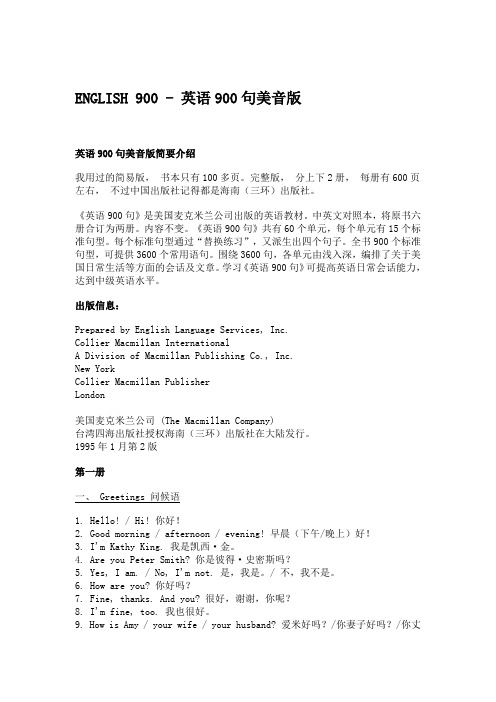
ENGLISH 900 - 英语900句美音版英语900句美音版简要介绍我用过的简易版,书本只有100多页。
完整版,分上下2册,每册有600页左右,不过中国出版社记得都是海南(三环)出版社。
《英语900句》是美国麦克米兰公司出版的英语教材。
中英文对照本,将原书六册合订为两册。
内容不变。
《英语900句》共有60个单元,每个单元有15个标准句型。
每个标准句型通过“替换练习”,又派生出四个句子。
全书900个标准句型,可提供3600个常用语句。
围绕3600句,各单元由浅入深,编排了关于美国日常生活等方面的会话及文章。
学习《英语900句》可提高英语日常会话能力,达到中级英语水平。
出版信息:Prepared by English Language Services, Inc.Collier Macmillan InternationalA Division of Macmillan Publishing Co., Inc.New YorkCollier Macmillan PublisherLondon美国麦克米兰公司 (The Macmillan Company)台湾四海出版社授权海南(三环)出版社在大陆发行。
1995年1月第2版第一册一、 Greetings 问候语1. Hello! / Hi! 你好!2. Good morning / afternoon / evening! 早晨(下午/晚上)好!3. I'm Kathy King. 我是凯西·金。
4. Are you Peter Smith? 你是彼得·史密斯吗?5. Yes, I am. / No, I'm not. 是,我是。
/ 不,我不是。
6. How are you? 你好吗?7. Fine, thanks. And you? 很好,谢谢,你呢?8. I'm fine, too. 我也很好。
9. How is Amy / your wife / your husband? 爱米好吗?/你妻子好吗?/你丈夫好吗?10. She is very well, thank you. 她很好,谢谢。
用english造句子简单
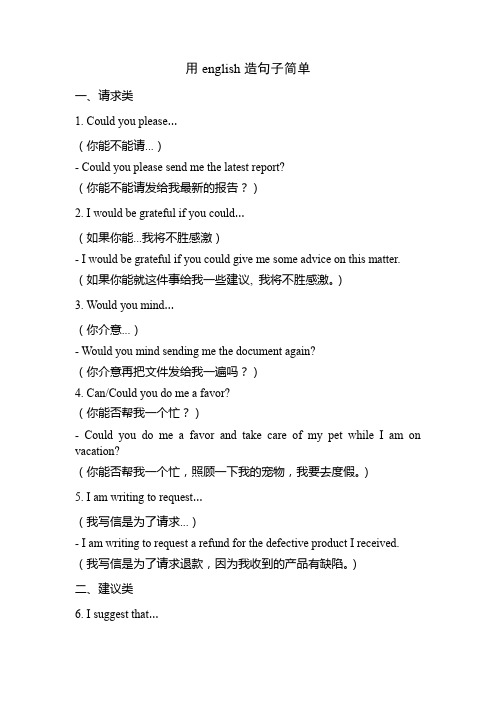
用english造句子简单一、请求类1. Could you please…(你能不能请...)- Could you please send me the latest report?(你能不能请发给我最新的报告?)2. I would be grateful if you could…(如果你能...我将不胜感激)- I would be grateful if you could give me some advice on this matter.(如果你能就这件事给我一些建议, 我将不胜感激。
)3. Would you mind…(你介意...)- Would you mind sending me the document again?(你介意再把文件发给我一遍吗?)4. Can/Could you do me a favor?(你能否帮我一个忙?)-Could you do me a favor and take care of my pet while I am on vacation?(你能否帮我一个忙,照顾一下我的宠物,我要去度假。
)5. I am writing to request…(我写信是为了请求...)- I am writing to request a refund for the defective product I received.(我写信是为了请求退款,因为我收到的产品有缺陷。
)二、建议类6. I suggest that…(我建议...)- I suggest that we should hold a meeting to discuss the issue.(我建议我们应该开一个会议来讨论这个问题。
)7. It might be a good idea to…(做...可能是个不错的主意)- It might be a good idea to hire an intern to help with the workload.(请一个实习生来帮忙可能是个不错的主意。
English900英语九百句(美音版)
第⼀册⼀、 Greetings 问候语1. Hello! / Hi! 你好!2. Good morning / afternoon / evening! 早晨(下午/晚上)好!3. I'm Kathy King. 我是凯西·⾦。
4. Are you Peter Smith? 你是彼得·史密斯吗?5. Yes, I am. / No, I'm not. 是,我是。
/ 不,我不是。
6. How are you? 你好吗?7. Fine, thanks. And you? 很好,谢谢,你呢?8. I'm fine, too. 我也很好。
9. How is Amy / your wife / your husband? 爱⽶好吗?/你妻⼦好吗?/你丈夫好吗?10. She is very well, thank you. 她很好,谢谢。
11. Good night, Jane. 晚安,简。
12. Good-bye, Mike. 再见,迈克。
13. See you tomorrow. 明天见。
14. See you later. 待会⼉见。
15. I have to go now. 我必须⾛了。
⼆、Expression In Class 课堂⽤语16. May I come in? 我能进来吗?17. Come in, please. 请进。
18. Sit down, please. 请坐。
19. It's time for class. 上课时间到了。
20. Open your books and turn to page 20. 打开书,翻到第20页。
21. I'll call the roll before class. 课前我要点名。
22. Here! 到!23. Has everybody got a sheet? 每个⼈都拿到材料了吗?24. Any different opinion? 有不同意见吗?25. Are you with me? 你们跟上我讲的了吗?26. Have I made myself clear? 我讲明⽩了吗?27. Could you say it again? 你能再说⼀遍吗?28. Any questions? 有什么问题吗?29. That's all for today. 今天就讲到这⾥。
对英语的看法 English
对英语的看法English is useful in our life. It canhelp us to understand the rest of the world. Because of English, we can travel abroad without a tour guide.English is useful. To my knowledge, English is the main language on the Internet. What’s more, English is one of the official languages of international organizations such as UN. As for email messages, experts believe that around 75% of them are in English.English is useful. It is used for getting better jobs. Half of all business deals are made in English. Now there are lots of foreign companies in China. So not only do students but also adults learn English for better jobs.English plays an important role in our life. It enables us to communicate with the world and makes our trip to English-speaking countries convenient.English is becoming more and more important in our daily life. Many English-speaking countries are developed and many other countries would like to learn from them. So they ask their people to learn English and study in America to make their countries stronger.It’s important for you to learn English better if you want to keep pace with the time.English is the main language of the Internet. More than 80% of the homepages are in English.English is popular. It is widely used in the world. You may see it everywhere, on the newspapers, on TV and even in the computer games.I think that English is more and more important in the world because English is one of the working languages at international meetings and it is widely used as a native language or an official language in many countries.Three quarters of the world’s books and newspapers are written in English; half of all business deals are made in English…How popular a language English is!There are some interesting things in English. Have you ever concentrated on its pronunciation? Some words are difficult to read,the others are easy. However, youcan easily find that if you can read the word, you can spell it according to the pronunciation.I think English is very interesting. Some words can be grouped into families. Some adjectives have abstract nouns that are part of the same family. For example,“length”comes from “long”and “height”comes from “high”etc.学习英语的感受:I find learning English is easy to start but hard to keep on. It’s very important to find a good method to make ourselves have confidence in carrying onlearning English.I find it interesting to learn English. I can not only have a lot of fun from it but also get much knowledge.For me, learning English is difficult and sometimes it’s a real headache, but it brings me a lot of fun. So I’ll work harder to learn English.In my opinion, learning English is enjoyable. When I learn English, I feel I’m flying in the sky like a bird or swimming in the sea like a fish.When I read English, I feel so exited that sometimes I get lost in the beauty of the language.I always feel interested and happy when I learn English because I have found lots of ways. On the other hand, I’m aware of my weakness in reading. So I will work harder on it and make progress in the future.Learning English is a bit difficult for me. There are a lot of new words I can’t remember well.It needs insistence and practice to learn English well. So I’ll try my best to keep learning. 观点和做法之间的过渡句Now let me tell you something about my English study.As for me, I learn English well in some ways. English is a useful language for us. …So, we should really learn it well, shouldn’t we? Here are some of my methods to learn English. (承上启下)假设你是Peter。
对英语的看法English
对英语的看法English在全球化的背景下,英语作为世界上最广泛使用的语言之一,对于我们每个人来说都具有重要的意义。
英语不仅仅是一门语言,更是一扇通向世界的窗户。
以下是我对英语的看法。
首先,英语语言的普及给我们带来了巨大的便利。
如今,在许多国家,英语几乎成为了第二个母语。
无论是商务交流、旅游观光还是学术研究,英语都是沟通的桥梁。
通过学习英语,我们能够更加便捷地与世界各地的人进行交流与合作。
在全球化的时代,掌握英语几乎是必备的能力。
其次,英语作为一门语言,具有广泛的文化影响力。
英语不仅仅是一种工具,更是一种文化。
英语文学、电影、音乐等都深深地影响着世界各地的人们。
通过学习英语,我们不仅仅是在学习一门语言,更是在接触和了解英语国家的文化。
这不仅丰富了我们的学识,也拓宽了我们的视野。
此外,学习英语有助于提升个人的就业竞争力。
如今,许多公司在招聘时都要求应聘者具备良好的英语能力。
掌握英语能力的人,在求职市场上往往更具竞争力。
英语能力不仅可以为我们开启更广阔的就业机会,还可以提升我们的职业发展空间。
然而,虽然英语的重要性毋庸置疑,但也存在一些问题和挑战。
首先,学习英语需要较长的时间和坚持不懈的努力。
英语是一门复杂的语言,初学者可能会遇到困难和挫折。
因此,我们需要付出更多的时间和精力来学习英语,不断提升自己的语言能力。
其次,英语学习中的口语能力、听力能力的培养相对较为困难。
在英语学习过程中,很多人发现自己的口语和听力能力相对较弱。
这主要是因为我们的语言环境和文化背景与英语国家存在差异。
为了提高口语和听力能力,我们需要积极参与英语口语交流活动,多听多说,不断提升自己的语感和语言表达能力。
最后,英语的发展和变化也是一个需要关注的问题。
英语是一门活语言,不断在发展和变化。
随着科技的进步和文化的交流,英语词汇和语法结构也会不断地变化。
因此,我们需要跟上英语的最新发展动态,持续学习和掌握新的词汇和表达方式。
综上所述,英语对于我们的日常生活、学习和职业发展具有重要意义。
英语_百度百科
英语
百科名片
英语(English)是联合国的工作语言之一,也是事实上的国际交流语言。英语属于印欧语系中日耳曼语族下的西日耳曼语支,并通过英国的殖民活动传播到世界各地。由于在历史上曾和多种民族语言接触,它的词汇从一元变为多元,语法从“多屈折”变为“少屈折”,语音也发生了规律性的变化。根据以英语作为母语的人数计算,英语可能是世界上第三大语言,但它是世界上最广泛的第二语言。世界上60%以上的信件是用英语书写的,上两个世纪英国和美国在文化、经济、军事、政治和科学上的领先地位使得英语成为一种准国际语言。
由于高考英语的地位很高,大学四六级与学位挂钩,近年来各界出现非常多的批评声音,指责中国教育过分强调英语的地位,忽视中文素质的培养,很多学生花费大量时间在英语上,影响了自己专业的学习,中文文化处于受歧视的地位。然而另一方,因为英语的准“世界语”地位,如果没有大量熟悉英语的人才,在全球化的进程中会产生负面影响。
(4)西撤克逊方言——泰晤士河以南的方言。诺森伯里亚和悔尔西亚这两种方言又合称盎格里亚方言,即盎格鲁人居住地区的方言。
二、中古英语时期——公元1100年至1500年 三、现代英语(Modern English,Mod E.)时期——公元1500年至今
现代英语时期又细分为: (1)早期现代英语时期——公元1500年至1700年; (2)后期现代英语时期——公元1700年至当前。
编辑本段历史时期
一、古英语时期——公元449年至1100年 古英语时期共有四种主要方言: (1)诺森伯里亚方言——洪伯河(the Humber)以北的方言;
(2)梅尔西亚方言——界乎洪伯河与泰晤士河之间的英国中部地区的方言; (3)肯特(Kentish)方言——居住在英国东南部地区的朱待人的方言;
